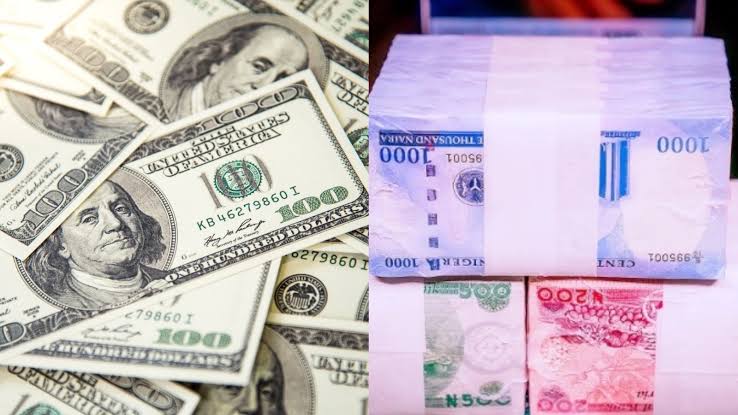What is the Dollar to Naira Exchange Rate at the Black Market, the Pounds to naira black market Today and the Euro To Naira today black market also known as the Parallel Market (Aboki FX)?
Please find below the black market exchange rate for the dollar to Naira on March 6, 2024. These are the rates at which you can exchange your dollar for Naira.
How much is a Naira to dollar today in the black market? Dollar to Naira Exchange Rate Today in the Black Market (Aboki Dollar Rate):
Dollar to Naira Black Market Rate Today, March 6, 2024:
Dollars to Nairas (USD to NGN) Black Market Exchange Rate Today
- Buying Rate: N1615
- Selling Rate: N1625
Pounds to Naira black market Today.
The British Pounds to Naira exchange rate is as follows.
- Buying Rate: N2590
- Selling Rate: N2600
100 Dollars To Naira in Black Market Today 2 March 6026
Euro To Naira today black market
The Euro To Naira black market exchange rate today is :
- Buying Rate: N1890
- Selling Rate: N1900
While the Central Bank of Nigeria (CBN) sets the official foreign exchange rate, transactions happening outside authorized channels, like the parallel market, operate independently. It is recommended to use authorized channels like banks for foreign exchange transactions.
Also See : Black Market Dollar rate to Naira Exchange today 22 February 2024
Dollar to Naira CBN Rate Today:
Dollar to Naira (USD to NGN) CBN Rate Today
- Buying Rate: N1,500
- Selling Rate: N1,506
Euro to Naira CBN Rate Today:
Dollar to Naira Exchange rate Today (CBN rates)
- Buying Rate: N1,696
- Selling Rate: N1,693
Pounds to Naira Today
Pounds to NGN CBN Rate Today
- Buying Rate: N1,886
- Selling Rate: N1,887
Euro to Naira Today
Euro to Naira exchange rate Today
- Buying Rate: N1,612
- Selling Rate: N1,613
Please be advised that the rates at which you buy or sell forex may differ from those displayed in this article due to price fluctuations.
Meanwhile, at the Lagos Parallel Market, popularly referred to as the Black Market, the exchange rate between the US dollars and the Naira concluded at 1650 per dollar yesterday, as reported by sources in the Bureau De Change (BDC).
Nwabali Breaks Silence On Union Saint-Gilloise Transfer Rumours
IMF Urges Nigeria to Prioritize Cash Transfers Before Addressing Fuel and Electricity Subsidies
The International Monetary Fund (IMF) has urged the Nigerian government to prioritize the full implementation of its cash transfer program aimed at supporting vulnerable households. This, the IMF emphasizes, is crucial before tackling the complex issue of fuel and electricity subsidies.
Cash Transfers for Vulnerable Households:
The IMF highlights the importance of maximizing the reach and effectiveness of the established social safety net program, designed to provide cash transfers to low-income and vulnerable individuals. Ensuring program effectiveness is critical to protecting these populations as the government considers adjustments to fuel and electricity subsidies.
Concerns over Fuel and Electricity Subsidies:
This recommendation stems from the IMF’s concerns regarding the fiscal burden associated with the current fuel and electricity subsidy practices. According to a statement following a recent mission to Nigeria led by Axel Schimmelpfennig, the IMF mission chief, the continued practice of capping fuel pump prices and electricity tariffs below their respective cost-recovery levels could cost Nigeria up to 3% of its GDP in 2024.
Economic Outlook and Challenges:
While acknowledging recent positive developments, such as improved revenue collection and rising oil production, the IMF emphasizes the need for further progress. Despite a projected GDP growth of 3.2% in 2024, Nigeria faces significant headwinds, including high inflation, a weakening currency, and the need for tighter monetary policy.
Commendation for Efforts on Food Security and Social Protection:
The IMF commended the Nigerian government’s efforts to address food insecurity and acknowledged the approval of the targeted cash transfer program. This initiative, alongside improvements in revenue collection and oil production, is seen as a positive step towards economic stability.
Emphasis on Addressing Fuel and Electricity Subsidies:
However, the IMF reiterates the urgency of addressing the financial implications of fuel and electricity subsidies. They emphasize the need for the full implementation of the cash transfer program to safeguard vulnerable populations before tackling these costly subsidies.
Monetary Policy and Cash Transfer Challenges:
The IMF also welcomed the recent decision by the Monetary Policy Committee (MPC) to raise the benchmark interest rate to combat inflation. Additionally, they acknowledged the challenges faced by the cash transfer program, including past allegations of misappropriation and subsequent suspension. The Nigerian government’s recent efforts to revamp the program and ensure direct payments are noted.
While Nigeria exhibits signs of economic improvement, several challenges remain. Addressing food insecurity, effectively implementing the cash transfer program, and finding sustainable solutions for fuel and electricity subsidies are critical steps towards long-term economic stability.






